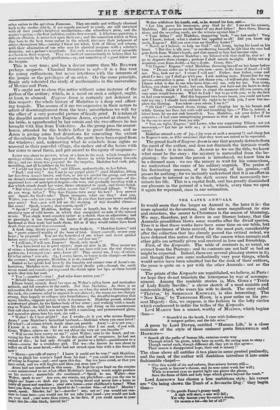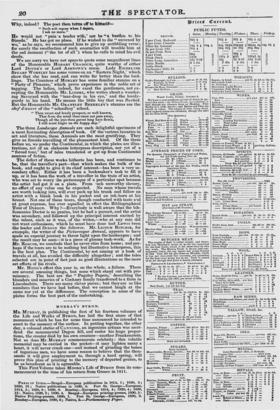THE LATER ANNIYALS.
IT would seem that the larger an Annual is, the later it is : the more splendid its decorations, and the more magnificent its size and structure, the nearer to Christmas is the season of blooming... We may, therefore, put it down in our literary botany, that the Annualis gmndiflom blows some months after the dwarf species. True it is that these works have been some time on our table, but as the specimens of them arrived, for the most part, considerably after the collection that has already passed the critical ordeal, we have deferred this notice of them till the season when annuals and. other gifts are actually given and received in love and friendship.
"On gentle.Fanny's.grassy tomb A sigh will start, a tear will fall; Yet ay lament your favourite's doom, Or mourn a lot—the lot of all?"
First, of the Keepsake. The table of contents is, as usual, an extract from the Peerage • and its contents are not half so bad as might be expected. Indeed, there are several pleasing stories in it; and though there are some undoubtedly very poor things, which would never have been admitted but for the rank of their authors, the prose is quite on a par with the other Annuals : not so the verse.
The prints of the Keepsake are republished, we believe, ni Pans: we hope they do not translate the letterpress by way of accompa- niment. Among the readable stories is, Mrs. Gem's "Trials of Lady Emily Saville ;" a clever sketch of a most amiable and intolerable fidget, who wears his wife to death. The story called "Therese," by SHERIDAN KNOWLES, iS also interesting. The "New King," by THEODORE Hoox, is a poor satire on his pre- sent Majesty : this, we suppose, is the fashion in the lofty circles which condescend to indite the trifles of the Keepsake. Lord MAHON has a sonnet, worthy of MILTON, which begins hus-
" Stretcli'd on the beach, I view with listless eyes A tempest gather, and the tide arise."
A poem by Lord DOVER, entitled "Human Life," is a close imitation of the style of those eminent poets STERNHOLD and
HOPKINS--
" Search all the paths of human life, examine every -way. Through which 'tis given, while here on earth, for erring man to stray: Though varied each, though different all, they yet in this agree— Their course is disappointed hope, their end is misery !"
The close above all entitles it to a place in some genteel psalmody, and the rank of the author will doubtless introduce it into some fashionable chapel- " O'er this world of sin and sadness, thus misery hovers still—
The earth. is Sorrow's throne, and its sons must work her will; While to wearied eyes no mortal light can pierce the gloom, Save the flame of faith and holy hope which glows beyond the tomb."
Lord ASHTOWN has chosen a less ambitious style: his verses are "On being shown the Tomb of a favourite Dog :" they begin thus—, Why, indeed? The poet then tutus off to hirOself- " Such soft repose when I depart,
I ask no more."
ne 'would not " pain' a tender wife," nor be "a burden to his friends." He has got no place. If he wished to die " unvexed by
as he says,. we recommend him to give up scribbling verse; for surely the recollection of such enormities will trouble him at the sad moment (" the lot of all ") when he calls to mind his evil deeds.
We are sorry we have not space to quote some magnificent lines of the Honourable HOBART CRADOCK, quite worthy of either Lord DOVER'S or Lord ASHTOWN'S muse. Lady EMMELINE STUART WORTLEY has some verses on an "Eastern Night," which show that she has read, and can write far better than the lord- lings. The Countess of MORLEY has some familiar stanzas on a "Party of Pleasure," which prove experience in the noble art of tagging. The ladies, indeed, far excel the gentlemen, not ex- cepting the Honourable Mr. LIDDEL, who writes about a wander- ing Savoyard with the "tear-drop in his eye," and the hurdy- gurdy in his hand. He means the little boy that was Barked. But the Honourable Mr. GRANTLEY BERKELEY'S stanzas are the chef dceuvre of the "schoolboy" school.
"Thou sweet and lovely prospect, so well known, That from the mind thou canst not pass away,
Though all the joys thou gayest long have flown, I still must linger on the happy day."
The three Landscape Annuals are each delightful specimens of a most fascinating description of book. Of the various luxuries in art and literature, these Annuals are the most gratifying. They give us fireside travelling of the pleasantest kind. Of the three before us, we prefer the Continental, in which the plates are illus- trations, not of an elaborate letterpress description, nor yet of a "forced tour," but of tales translated or got up from Continental sources of fiction.
The defect of these works hitherto has been, and continues to be, that the traveller's part-that which makes the bulk of the book, and ought to give it its chief interest-has been a very se- condary affair. Either it has been a bookmaker's task to fill it up, or it has been the work of a traveller in the train of an artist, who was set to worry he picturesque of a particular spot because the artist had got it on a plate. From -uch unworthy slavery, no effort of any value can be expected. No man whose travels are worth looking into, will ever pack up his trunk and follow an artist with a blank book in his pocket and an ink-horn at his breast. Not one of these tours, though conducted with taste aqd at great expense, has ever equalled in effect the Bibliographical Tour of DisniN. Why P-Everybody is well aware that the bib- liomaniac Doctor is no genius, but he had a pursuit, and the artist was secondary, and followed up the principal interest excited by the talent, such as it was, of the writer,-who at any rate did not want enthusiasm, which he must have done had LEWIS been the leader and DIBDIN the follower. Mr. LEITCH RITCHIE, for example, the writer of the Picturesque Annual, appears to have made an especial journey to throw light upon the landscapes ; and the result may be seen-it is a piece of gloomy task-work. As for Mr. ROSCOE, we conclude that he never stirs from home; and per- haps if the tours are to be nothing but illustrative letterpress, this is the best plan. The Continental, by not aiming at a book of travels at all, has avoided the difficulty altogether ; and the tales selected are in point of fact just as good illustrations as the more set efforts of his rivals.
Mr. HOOD'S effort this year is, on the whole, a failure. There are several amusing things, but none which stand out with pro- minency. The best are the " Pugsley Papers," describing the blunders and miseries of a Cockney family transferred to a farm in Lincolnshire. There are many clever pieces; but they are so like numbers that we have had before, that we cannot laugh at the same nor yet at the difference. The conception in some of the plates forms the best part of the undertaking.































 Previous page
Previous page